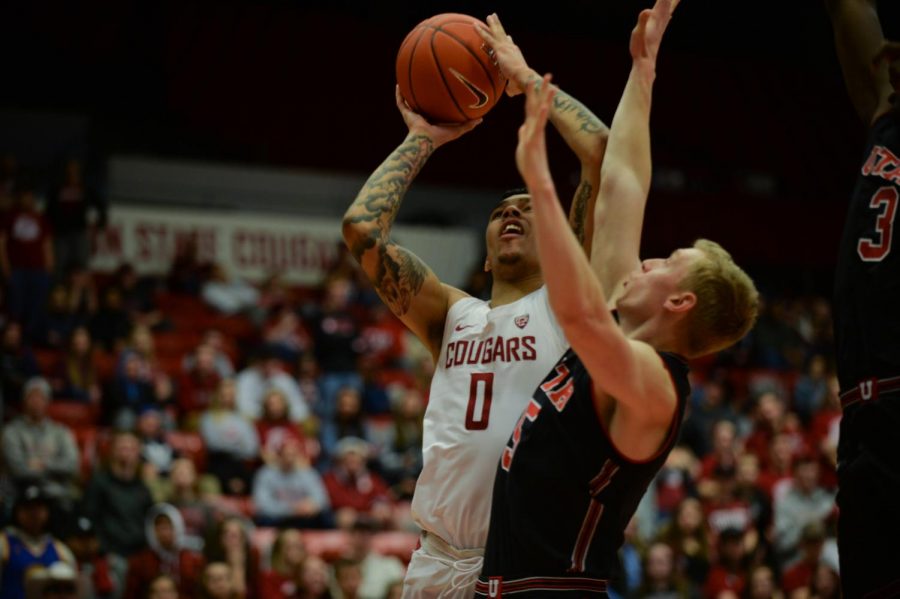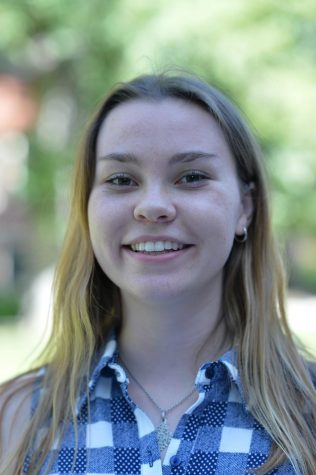Started from the bottom now he’s here
Junior power forward Isaiah Wade faced adversity before coming to WSU, found way out of poverty through basketball
JACK LEWIS-CLARKE | DAILY EVERGREEN FILE
WSU junior forward Isaiah Wade shoots a basket in a game against Utah on Feb. 23 at Beasley Coliseum.
March 19, 2019
Growing up, the odds were stacked against Isaiah Wade but he persevered and carved out a path for himself through basketball.
Wade was born and raised in Minneapolis. He became homeless in the fourth grade and he said he didn’t get to have a childhood.
Wade didn’t find a way out of his situation until the 11th grade when he started playing basketball.
Years before Wade joined a basketball team, his father Irwin Wade Jr. was in an accident that led him to drug addiction. Wade’s parents separated when he was in the fourth grade and a few weeks later he was living with his father in a shelter.
“I didn’t want him to be by himself,” Wade said.
Wade said he had a strained relationship with his mom, Rebecca Houston, during his time in elementary school and moving out was best for both of them. This forced Wade to grow up faster as he lived in and out of shelters with his father.
Before he was old enough to join the workforce he mowed lawns and shoveled snow in bitter Minnesota winters. But his father’s addiction meant most money he and his dad brought in disappeared.
School didn’t provide much hope either.
“[Wade’s] high school was a pretty rough inner city high school,” said Tammy Ewing, a former administrative assistant at Minnesota Transitions Charter School. “That school has a lot of kids doing a lot of things — he was a role model to half of them even though he wouldn’t believe he was.”
Ewing knew Wade’s family and she said several shelters kicked Wade and his father out because of Irwin’s drug use. When the two lost access to a shelter, Ewing allowed Wade to stay with her for about a week.
Eventually, Ewing said Wade’s mother signed the papers giving Ewing legal guardianship of Wade and he moved in with her for good.
“After the third or fourth time he got put out he was like ‘Ma I don’t want to go back there’ and I said, ‘You’re not,’ ” she said.
Wade said he considers Ewing a second mother and she helped push him through adversity.
“Now that he’s doing something, everybody’s like ‘Oh we love you,’ ” Ewing said. “But when he was struggling … it was a struggle.”
During this time, Wade battled with a learning disability in school, tension with his birth mother and he worried about his father all the time.
“He cares about everybody I think before he cares about himself,” Ewing said. “He didn’t have a lot of faith in himself. He cared about everybody but himself.”
But he pushed through it and during his junior year in high school at Minnesota Transitions Charter School he averaged 18.4 points and 12.2 rebounds per game.
Ewing said Wade knew if his grades slipped she wouldn’t let him play anymore so he stayed on top of his school work.
“I was hard on him but I think that’s why he loves me so much,” she said.
When Wade turned 17 he felt grown and ready to move on and he didn’t want to deal with curfews and house rules anymore, Ewing said. So for his senior year, he moved to Waterloo, Iowa to live with his brother, Lyrikal, who is a music producer.
That season he averaged 15.2 points, eight rebounds and seven assists per game and earned Mississippi Division player of the year honors.
He also found a passion for rapping which fostered during his time at his brother’s.
“All my brothers do music,” Wade said. “There’s a studio in the basement and I just stayed down there all the time.”
Wade, who goes by Zay in his music videos, doesn’t freestyle. He writes his bars carefully to tell his story. He said too many young rappers repeat the same violent phrases and don’t rap about what they’ve lived.
“I have a big story to tell,” Wade said. “I’m [Division] 1, people ask me everyday , ‘How did you do it?’ and through my music, I want to tell them how I did what I did.”
Wade’s lyrics are about perseverance. He talks about starting from the bottom, playing basketball and his dreams.
“I hopped up out that sewer like yeah [expletive] I’m with it,” he said in one of his raps, “only had a dream, no dollar.”
He said he’s living a part of that dream now, playing teams in the Pac-12 he used to watch on TV.
But before he could reach WSU, he had one more hurdle to jump.
Wade played two seasons at Iowa Western Community College after graduating high school, where he averaged 12.1 points and a team-high of 9.5 rebounds per game.
He said he ended up dropping out of college in Iowa for a time to help his father, who couldn’t get into a shelter without a son or daughter. The situation mirrored his life before basketball.
“He wanted to stay to take care of his dad, that was his original thing,” Ewing said. “And he thought he could do it.”
Now that the junior power forward is in Pullman, Wade hopes he can earn enough money to support his parents financially. He wants to play in the NBA and have the funds to start a homeless shelter.
“I’d make a big shelter for free, provide food and give back because I’ve been through it,” he said.
He said his dad is still homeless, as far as he knows because his father’s calls come from different numbers.
Wade said he struggles with missing his family more than anything.
“I come out of games sometimes and I see some of the players have all their family there,” Wade said. “I walk, I look and I just got to go straight on the bus because none of mine is there.”
Despite the distance, Ewing said his success means something to people from his inner-city home in Minneapolis.
“He’s got a lot of people that he’s a role model to here,” she said. “I told him today how proud I am of him.”
Wade said he is grateful for the opportunity to play for the Cougars.
“I’m at the highest point of my life,” Wade said. “There’s a lot of people that want to be in this position … and I’m actually here.”










